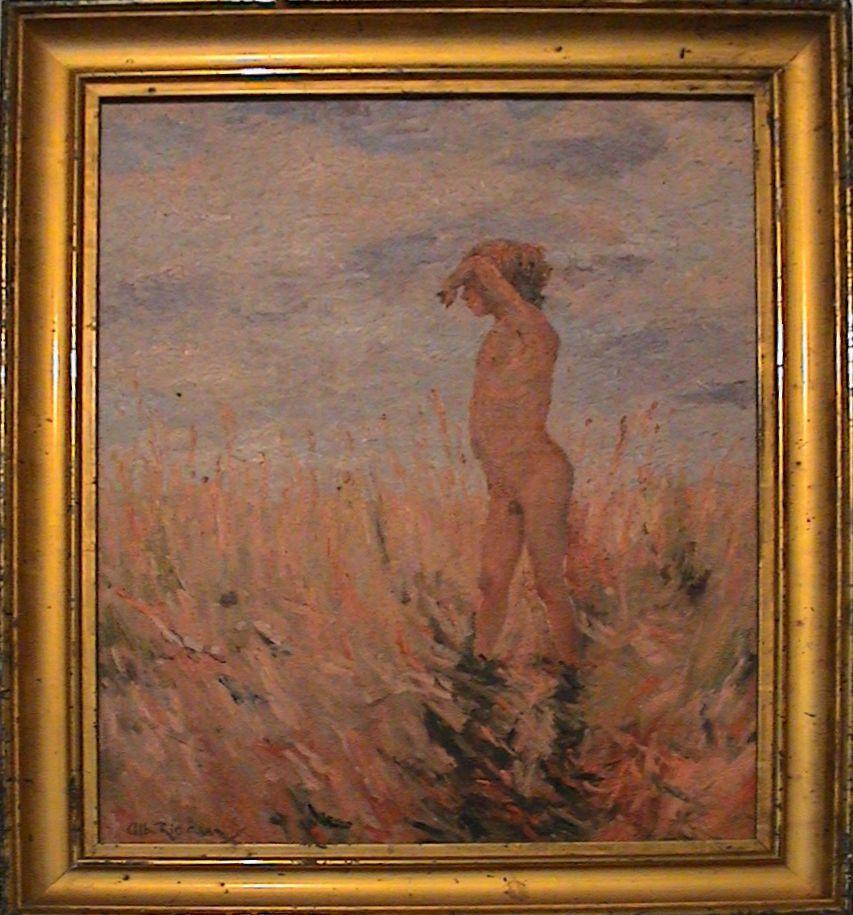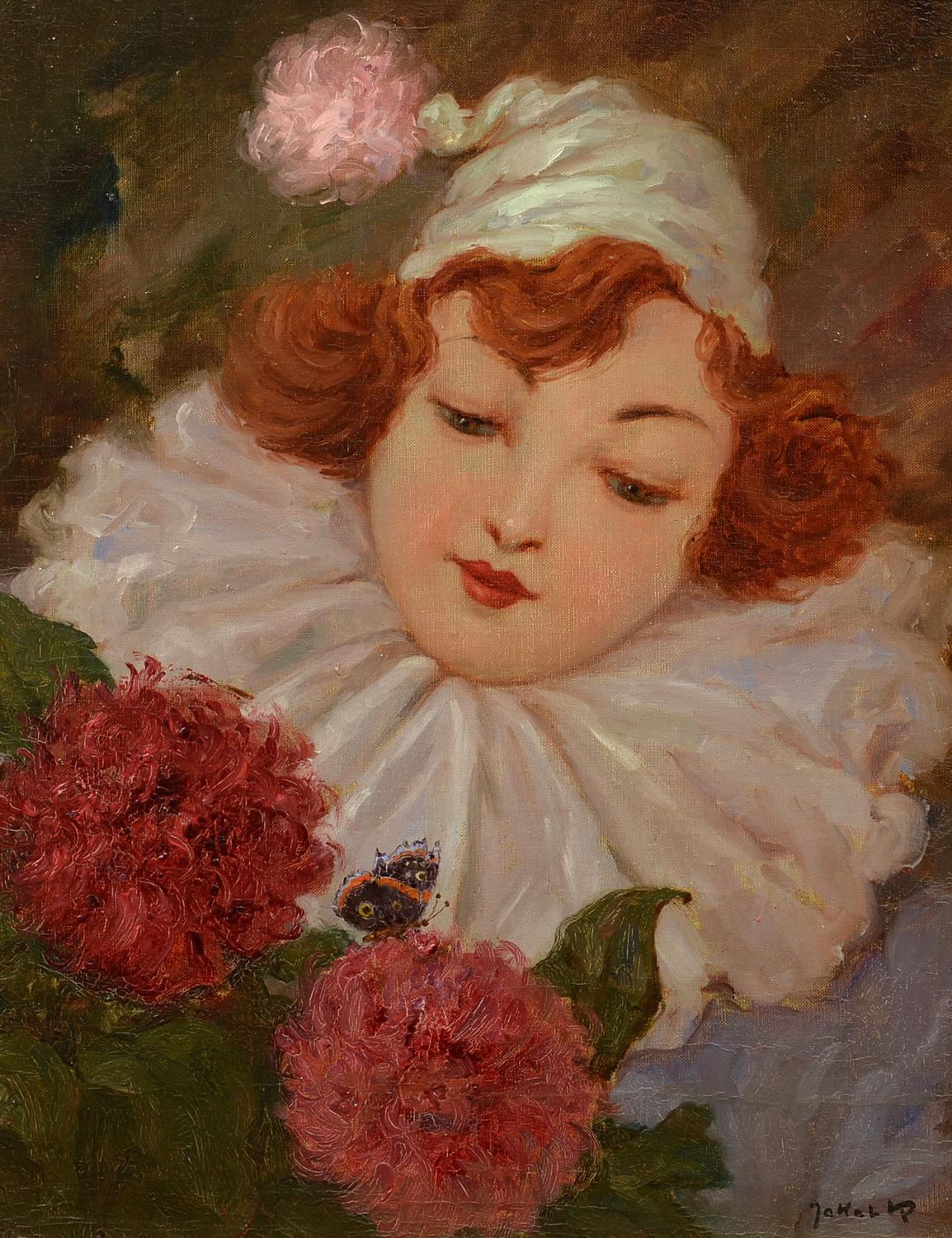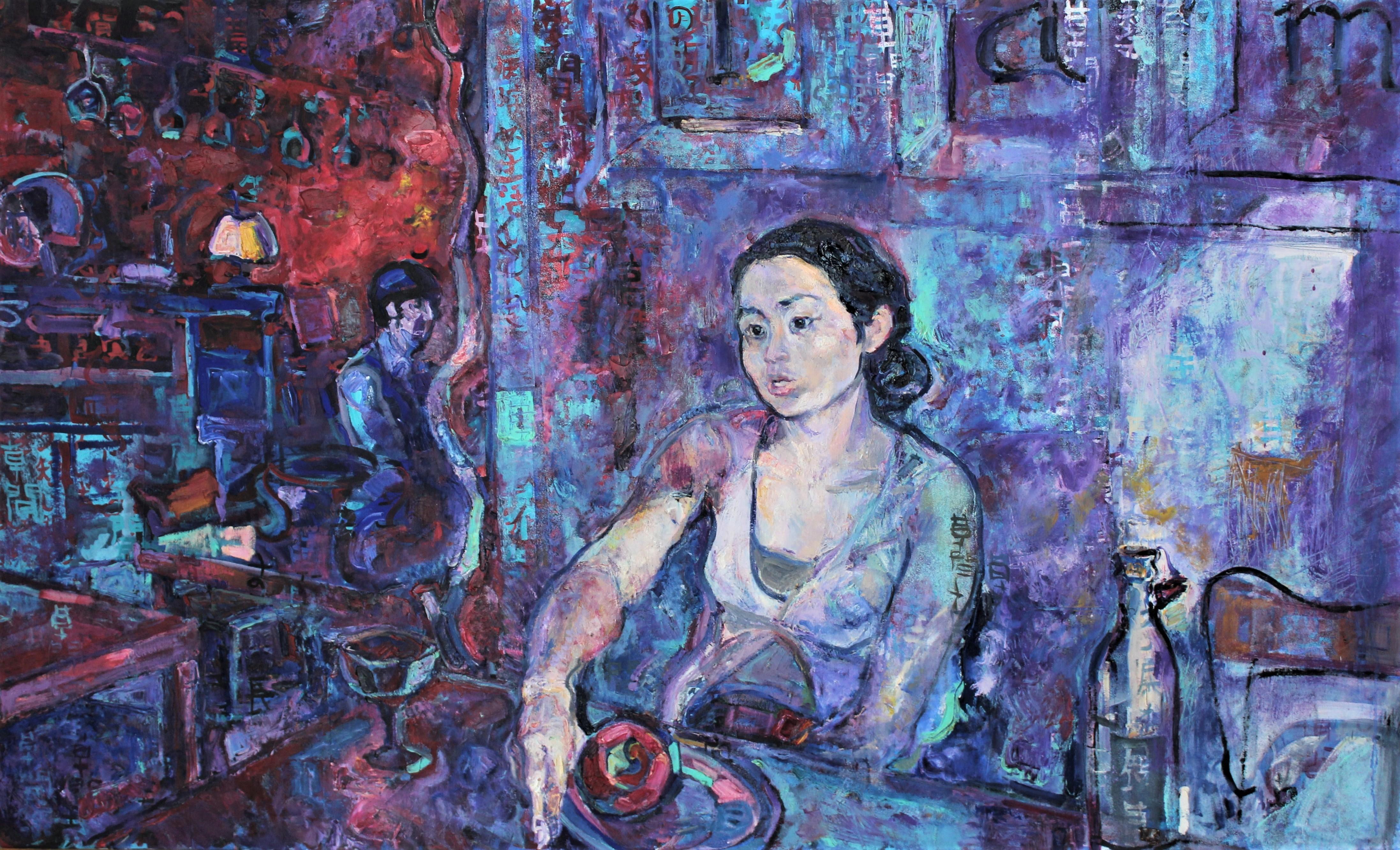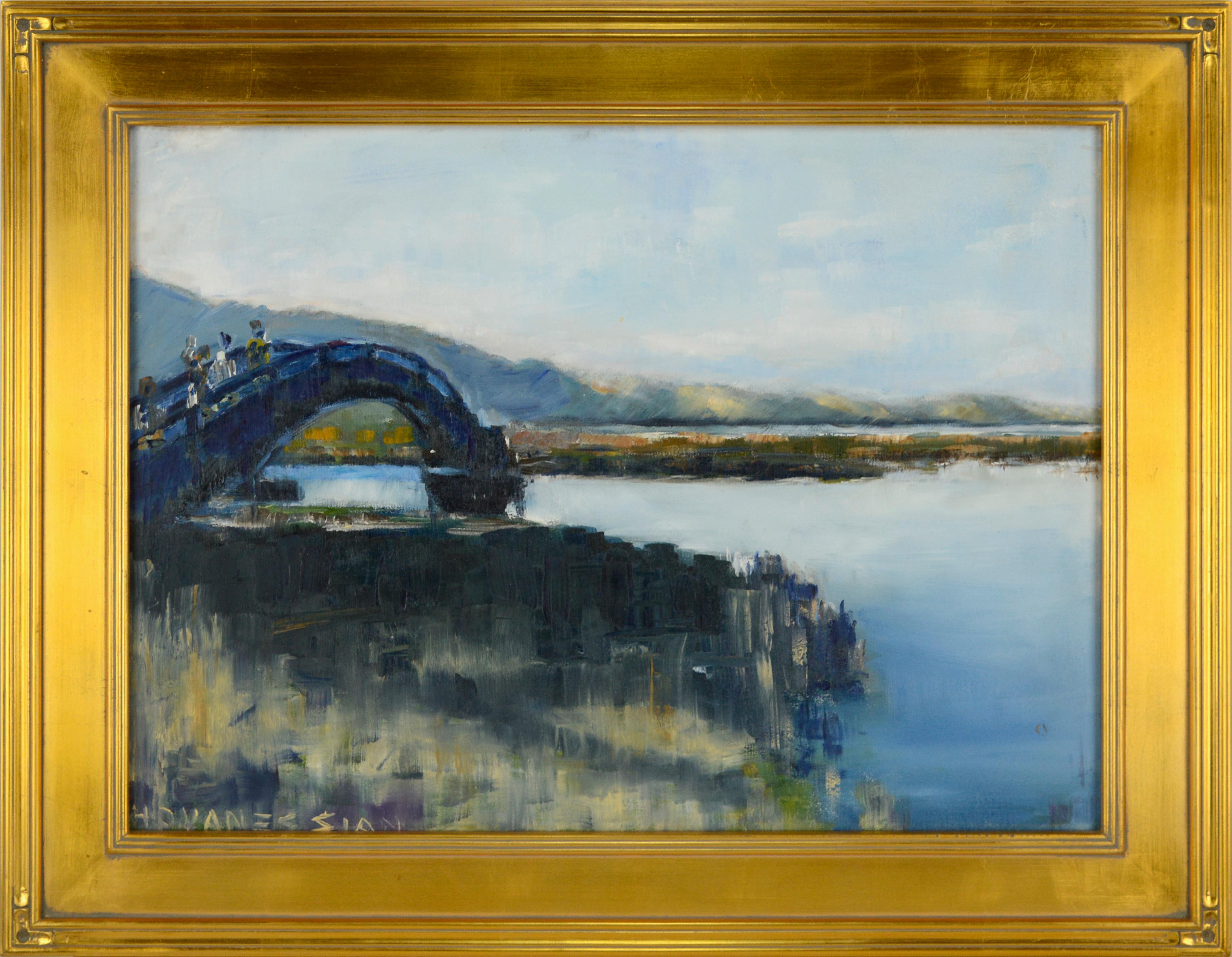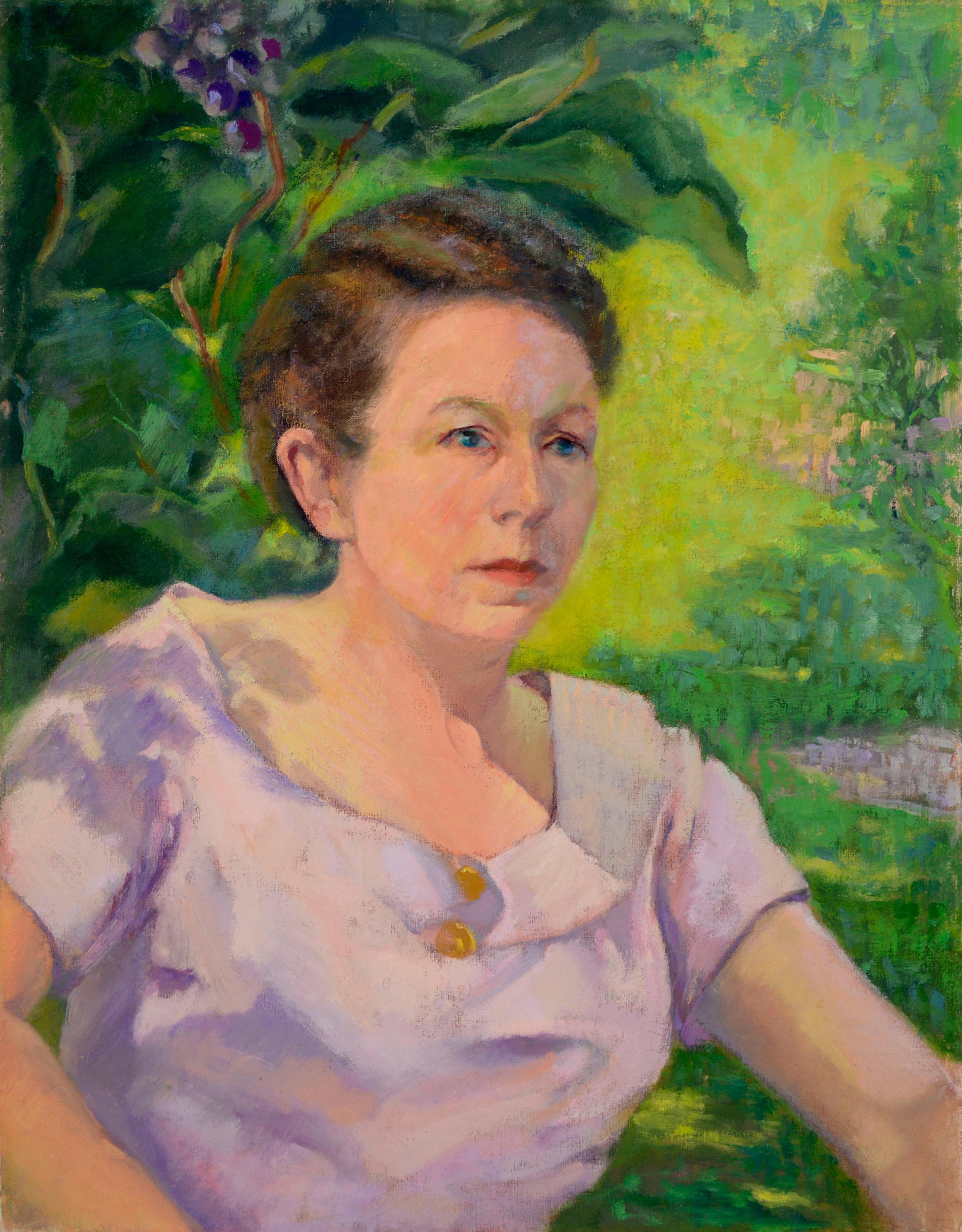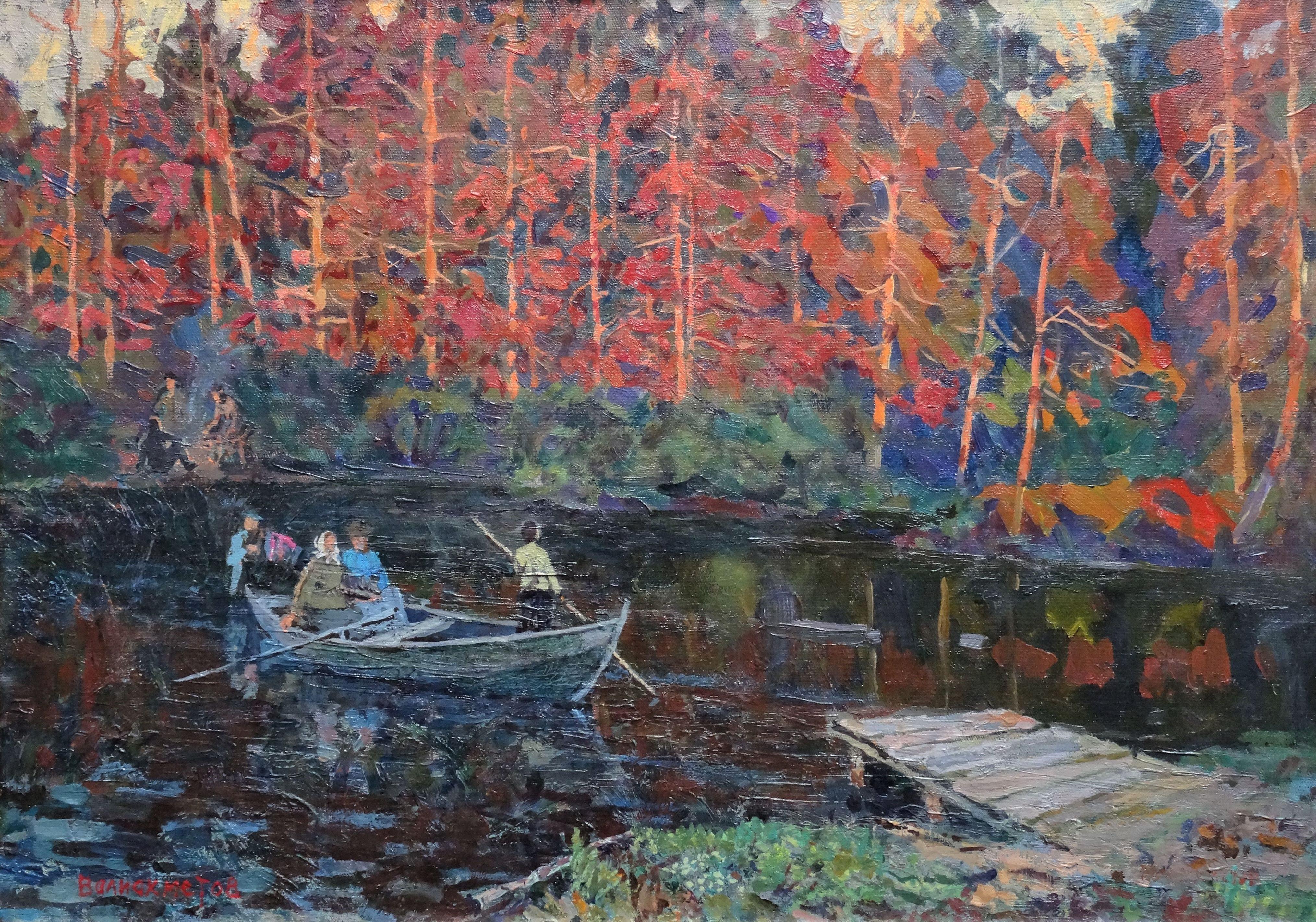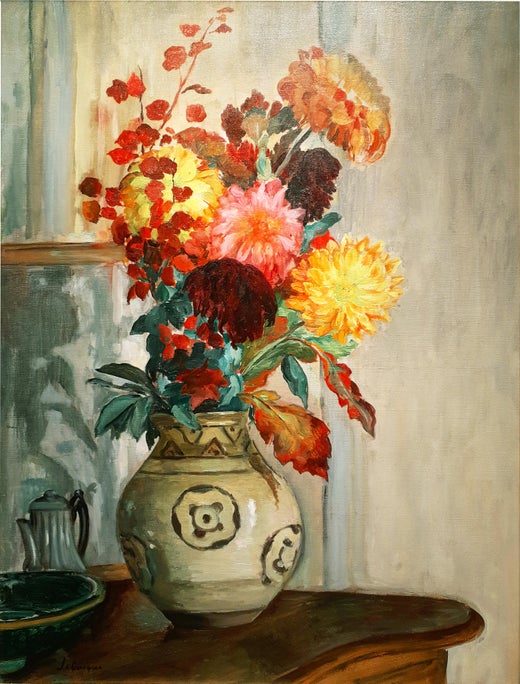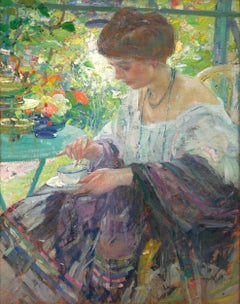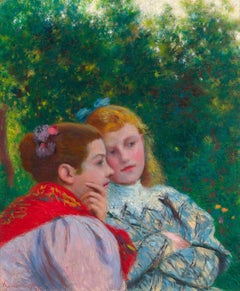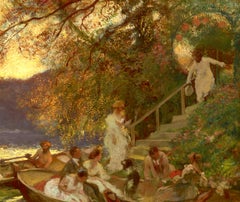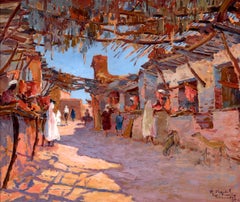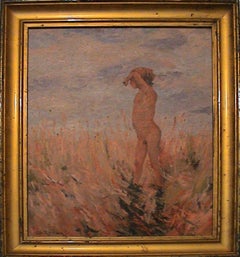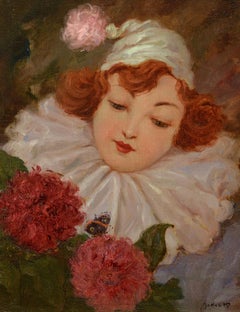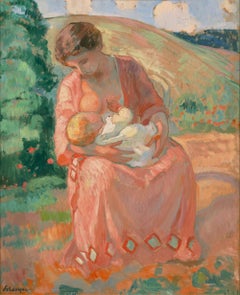
Maternité by Henri Lebasque
View Similar Items
Want more images or videos?
Request additional images or videos from the seller
1 of 9
Henri LebasqueMaternité by Henri Lebasque1912
1912
About the Item
- Creator:Henri Lebasque (1865-1937, French)
- Creation Year:1912
- Dimensions:Height: 36.38 in (92.41 cm)Width: 31.13 in (79.08 cm)Depth: 2 in (5.08 cm)
- Medium:
- Movement & Style:
- Period:
- Condition:
- Gallery Location:New Orleans, LA
- Reference Number:Seller: 31-67581stDibs: LU18611945052
Henri Lebasque
Henri Lebasque (25 September 1865 – 7 August 1937) was a French post-impressionist painter. He was born at Champigné (Maine-et-Loire). Lebasque was a founding member of the Salon d'Automne in 1903 with his friend Henri Matisse. Two years later, a group of artists exhibited there including Georges Rouault, André Derain, Édouard Vuillard, and Matisse. Lebasque also became friends with artists such as Gustave Rouault, Raoul Dufy, Louis Valtat, and Henri Manguin, the last of whom introduced Lebasque to the South of France. His time in South of France would lead to a radical transformation in Lebasque’s paintings, changing his colour palette forever. Other travels included the Vendée, Normandy, and Brittany. His work is represented in French museums, notably Angers, Geneva (Petit Palais), Lille (Musée des Beaux-Arts), Nantes, and Paris (Musée d’Orsay). Lebasque died at Cannet, Alpes Maritimes in 1937.
About the Seller
5.0
Vetted Professional Seller
Every seller passes strict standards for authenticity and reliability
Established in 1912
1stDibs seller since 2013
16 sales on 1stDibs
Typical response time: 6 hours
Authenticity Guarantee
In the unlikely event there’s an issue with an item’s authenticity, contact us within 1 year for a full refund. DetailsMoney-Back Guarantee
If your item is not as described, is damaged in transit, or does not arrive, contact us within 7 days for a full refund. Details24-Hour Cancellation
You have a 24-hour grace period in which to reconsider your purchase, with no questions asked.Vetted Professional Sellers
Our world-class sellers must adhere to strict standards for service and quality, maintaining the integrity of our listings.Price-Match Guarantee
If you find that a seller listed the same item for a lower price elsewhere, we’ll match it.Trusted Global Delivery
Our best-in-class carrier network provides specialized shipping options worldwide, including custom delivery.More From This Seller
View AllYoung Woman in Interior by Richard E. Miller
By Richard Edward Miller
Located in New Orleans, LA
Richard E. Miller
1875-1943 American
Young Woman in Interior
Signed "Miller" (lower right)
Oil on canvas
Richard E. Miller's Young Woman in Interior exemplifies the artist's exce...
Category
20th Century Impressionist Figurative Paintings
Materials
Canvas, Oil
Les deux soeurs by Federico Zandomeneghi
By Federico Zandomeneghi
Located in New Orleans, LA
Federico Zandomeneghi
1841-1917 Italian
Les deux soeurs
(The two sisters)
Signed and dated "Zandomeneghi 95" (lower left)
Oil on canvas
Two sisters enjoy a quiet moment in a rich green landscape in this intimate oil on canvas from Federico Zandomeneghi. An Italian painter by birth who became a fixture in the Parisian Impressionist scene, Zandomeneghi is best remembered for his sentimental and affectionate scenes of women in both domestic and public spheres.
Zandomeneghi’s creative and technical prowess in composition is highlighted in this painting. The artist deftly frames the young pair in the lower register of the canvas, imbuing the work with a remarkably observational feel. The girls pensively gaze off to the right, lost in thought; Zandomeneghi allows the viewer to witness a natural moment of discussion and contemplation shared among the sisters. The soft palette employed by the artist gives the whole scene an atmospheric glow, with dappled rays of sunshine breaking through the lush foliage. Though the girls remain in the shaded areas of the landscape, Zandomeneghi’s skillful application of paint allows a brightness to remain nevertheless.
Federico Zandomeneghi was born in Venice to a long line of neoclassical sculptors. As if created to be an artist, Zandomeneghi began his artistic education early, enrolling in the Accademia di Belle Arti in Venice at just 15 years old before transferring to the Academy of Fine Arts in Milan. By 1862, the artist had arrived in Florence, where he became fast acquaintances with several Italian artists dedicated to executing landscape paintings en plein air. Zandomeneghi embraced the spontaneity, seeking to bring unparalleled luminosity to his works.
When Zandomeneghi arrived in Paris in 1874, he found kindred spirits...
Category
19th Century Impressionist Figurative Paintings
Materials
Canvas, Oil
L’embarquement by Gaston La Touche
By Gaston La Touche
Located in New Orleans, LA
Gaston La Touche
1854 - 1913 French
L’embarquement
The Embarkment
Signed "Gaston La Touche" (lower right)
Oil on panel
A fashionable group of merrymakers boards a rowboat at sundown in this oil on panel by renowned French painter Gaston La Touche. Softly lit and lushly detailed, the work represents the artist’s talent for capturing the gaiety of the Belle Époque. With its luminous coloring and feathery brushwork, this oil evokes the style and joie de vivre of the era rendered in La Touche’s distinctive, mature style.
Fresh and airy, the work is a beautiful example of the artist’s skill at capturing the subtle qualities of light and color. Set against the plein air backdrop of a wooded pond awash in the soft glow of the golden hour, the scene reflects the influence of the Impressionists. The subject also recalls works by Manet, Monet and Renoir, who delighted in depictions of modern leisure among the expanding middle class. The scene is an informal one, and its unconventional cropping suggests that the viewer is invited to take a seat in the boat and join the group on their outing. Such relaxed, inviting scenes were remarkably popular among contemporary, modern audiences. However, La Touche's style is singular, possessing an element of fantasy and romance that set him apart from the Impressionists.
Gaston La Touche was born in St. Cloud, outside of Paris, in 1854, and he showed a keen interest in art from a young age. At ten years old, he began taking private art instruction, which lasted until 1870, when his family was forced to flee to Normandy amid the Franco-Prussian War. This was the only formal art training La Touche would ever receive. Despite his lack of Academy training, he made his debut at the Paris Salon of 1875 with a sculptural medallion and etchings, and he exhibited his first painting at the Salon of 1881. Although he began his career painting dark-toned realist compositions, by 1890, his style had shifted to what would become his signature — a lighter, brighter, idealistic society world.
The artist was associated with practically all of the most influential artists and thinkers of late 19th century France, including Édouard Manet, Edgar Degas, Émile Zola, who frequently met at the legendary Cafe de la Nouvelle Athenes to share their thoughts on modern society. In 1900, he was named a Chevalier of the Legion d'Honneur and an Officer in 1909. Additionally, he was well-decorated at the grand...
Category
Late 19th Century Impressionist Figurative Paintings
Materials
Oil, Panel
Taroudant
Located in New Orleans, LA
Signed, inscribed and dated "R. Pinatel / Taroudant / 1926" (lower right)
Oil on panel
A stunning ode to the Moroccan landscape, this oil on panel was composed by the French Orientalist painter Raphaël Pinatel, whose lively works adeptly translated the romanticism of the East for a Western audience. The present work, which captures a market in Taroudant, a city in southeastern Morocco, exemplifies the artist’s distinctive approach as he brilliantly translates the energy and atmosphere of the desert city. Pinatel’s style is impressionistic in his brushwork and handling of light and atmosphere. In the present work, he brilliantly captures the effects of the direct desert sun...
Category
Early 20th Century Impressionist Landscape Paintings
Materials
Oil, Panel
Après le bain (After the bath)
By Pierre Auguste Renoir
Located in New Orleans, LA
For Pierre-Auguste Renoir, Impressionism's pre-eminent figure painter, depicting the nude was an exercise in bringing the canvas to life. He once said, “I look at a nude, I see myriads of minuscule shades. I have to find those which will make the flesh on my canvas come to life and resonate.” This compelling portrait by Renoir entitled Après le bain presents the nude figure of a woman in a serene, private moment, absorbed in the task of drying herself after a bath. The artist’s mastery of light and shading is incredible, achieving a sense of vitality in this otherwise ordinary scene.
Renoir is celebrated for his figural work, especially his Rubenesque female nudes, however, it was not until the artist was in his forties that he depicted the nude with any frequency. In 1881, Renoir traveled to Italy, where he studied the works of the Renaissance masters and the ancient art of Pompeii and Rome. Upon his return to France, the nude became his favored subject, and he used the motif to combine the spontaneity of Impressionism with the solid modeling of classical painting. Renoir’s medium here, sanguine, a reddish-brown chalk, was used extensively in the Renaissance by Leonardo (who employed it in his sketches for the Last Supper), Michelangelo and Raphael. Its warm hue lends itself well to depicting flesh, and the chalk drawing allows for a greater focus on line, form and texture in a departure from the aspects of color and light that so often preoccupied the Impressionists. Après le bain conveys the impression of arrested motion with perfect naturalness, deftly capturing the moment before the elegant lines of the sitter's form change position.
The sitter is almost certainly Gabrielle Renard, the nanny to Renoir’s children and a frequent model for the artist. Gabrielle was the cousin of Renoir’s wife, Aline, and came to Montmartre to work for the family at the age of 16. She developed a strong bond with the family and became a favorite subject for Renoir, appearing in several of his most important works, including his 1911 Gabrielle with a Rose (Musée d'Orsay). When Renoir began to suffer from severe rheumatoid arthritis that would eventually leave him unable to walk and scarcely able to grasp a paintbrush, it was Gabrielle that would assist the artist by positioning the paintbrush between his crippled fingers.
Born in Limoges, France in 1841, Renoir began his career as an apprentice to a painter of porcelain wares. He later moved to Paris at the age of 21, enrolling at the prestigious École des Beaux-Arts. It was here, while studying under Charles Gleyre, that Renoir attained a tremendous appreciation for the academic style of painting, a quality that would last throughout his career. This was also when he met Claude Monet and several other classmates, with whom he would later form the Impressionists.
Working closely with Monet, Renoir began experimenting with the portrayal of light and its effect on his canvases. The youngest member of the Impressionist movement, an astute Renoir recognized how a subject was constantly changing due to the dynamic effects of light on color. Relying heavily upon his academic training that focused on composition, lines and descriptive details, Renoir distinguished himself among his contemporaries. His intuitive use of color and expansive brushstroke, along with acute attention to his subject, have placed him among the finest painters in history.
This work is accompanied by a certificate of authenticity and will be included in the forthcoming catalogue raisonné of the work of Pierre-Auguste Renoir from the Wildenstein Plattner Institute.
Circa 1898
Canvas: 43 1/2" high x 35 1/2" wide
Frame: 57 3/4" high x 49 1/4" wide
Provenance:
Galerie Durand-Ruel, Paris (acquired from the artist on January 25, 1899)
J. Pereire Collection, France (1966)
Sam Salz, New York (before 1981)
Claus Virch, Paris
French Compagny, Inc., New York
Larry Silverstein, New York (circa January 1987)
Le Clos de Sierne Gallery, Geneva
Galerie Heyram, Paris (October 1987)
Francis Gross
M.S. Rau, New Orleans
Literature:
B. Schneider, Renoir, Berlin, 1957, p. 95 (illustrated in color, p. 83)
M. Gauthier, Renoir, Paris, 1958, p. 83 (illustrated in color; erroneously dated '1916' and titled 'Woman in her toilet')
F. Fosca, Renoir, L'homme et son obra, Paris, 1961, p. 280 (illustrated, p. 95; erroneously dated 'about 1890' and titled 'After the Bath...
Category
19th Century Impressionist Nude Paintings
Materials
Canvas, Paper, Chalk
Price Upon Request
Danseuse By Pierre Carrier-Belleuse
By Pierre Carrier-Belleuse
Located in New Orleans, LA
Pierre Carrier-Belleuse
1851-1932 French
Danseuse
Signed “Pierre Carrier-Belleuse” (lower right)
Pastel on canvas
Strikingly elegant, this extraordinary pastel by French impressi...
Category
19th Century Impressionist Figurative Drawings and Watercolors
Materials
Canvas, Pastel
You May Also Like
Oil on Canvas "Pascal", ca. 1931 by Albert Rigaux
Located in Berlin, DE
Oil on canvas by Albert Rigaux, ( Schaerbeek 1897-1981 Brussels ) Signed lower left: Alb. Rigaux. Titled by hand verso.
Provenance: estate of the artist Measurements: 19.69 x 15.75...
Category
1930s Impressionist Figurative Paintings
Materials
Canvas, Oil
Sun Bath, figurative, Original Oil Painting, Handmade Artwork, One of a Kind
Located in Granada Hills, CA
Artist: Ashot Muradyan
Work: Original Painting, Handmade Artwork, One of a Kind
Medium: Oil on Canvas
Year: 2022
Style: Impressionism,
Subject: Sun Bath,
Size: 20" x 26" x 0.8'' i...
Category
2010s Impressionist Figurative Paintings
Materials
Canvas, Oil
"Pierrot and the Butterfly, " Early 20th Century Impressionist Oil Portrait
Located in Wiscasset, ME
"Pierrot and the Butterfly" is an early 20th century Impressionist oil portrait. The painting is indistinctly signed lower right and m...
Category
Early 20th Century Impressionist Figurative Paintings
Materials
Canvas, Oil
"The Artist's Wife at the Loom, " Harry Hoffman, Bright American Impressionism
By Harry Leslie Hoffman
Located in New York, NY
Harry Leslie Hoffman (1871 - 1964)
The Artist's Wife (Beatrice Pope) at the Loom, circa 1915
Oil on canvas
30 x 32 inches
Housed in a period Newcomb-Macklin frame
Provenance:
Estate of the artist
Private Collection, Massachusetts
This painting depicts the artist's wife at the loom, producing textile versions of Hoffman's underwater paintings. The screen shown behind Bea is an underwater scene also painted by Hoffman. The study of this painting is held in the collection of the Wolfsonian Museum in Florida.
Harry Leslie Hoffman was born in Cressona, a small community in Pennsylvania's Schuylkill Valley. His mother was an amateur artist who encouraged her son to pursue a career in the arts. In 1893, Hoffman entered the School of Art at Yale University and studied with John Ferguson Weir, the son of Robert Walter Weir. After graduation in 1897, Hoffman moved to New York to continue his studies at the Art Students League. He also traveled to Paris and took classes at the Académie Julien.
In the summer of 1902, Hoffman attended the Lyme Summer School of Art, in the town of Old Lyme on the Connecticut coast. The school was headed by Frank Vincent Dumond and was located in a boarding house owned by Florence Griswold. The school eventually grew into an artists' colony and a center for American Impressionism. When Hoffman first arrived as a student, he was not permitted to stay in the house which was designated for the professional artists only. However, his outgoing personality soon won him many friends at the colony.
In 1905, Hoffman settled in Old Lyme and worked as a full member of the artist colony. He was particularly influenced by Willard Leroy Metcalf, an Impressionist also working in Old Lyme. Fellow artists later fondly recalled Hoffman's antics at the Griswold house, which included playing the flute and banjo, tap-dancing, singing humorous songs, and performing magic tricks. In 1910 Hoffman...
Category
1910s American Impressionist Figurative Paintings
Materials
Canvas, Oil
Saint Germain-des-Prés under the snow. Oil on canvas, 60x92 cm
By Constantine Kluge
Located in Riga, LV
Saint Germain-des-Prés under the snow. Oil on canvas, 60x92 cm
Constantin Kluge was a Russian-born French painter best known for his naturalistic scenes of Paris and French countrys...
Category
1950s Impressionist Landscape Paintings
Materials
Canvas, Oil
Restaurant terrace at evening in Montmartre, Paris. Oil on canvas, 46x38 cm
Located in Riga, LV
Restaurant terrace at evening in Montmartre, Paris. Oil on canvas, 46x38 cm
Category
1950s Impressionist Landscape Paintings
Materials
Canvas, Oil
$8,011 Sale Price
20% Off
Recently Viewed
View AllRead More
Paul Revere Crafted This Silver Coffee Pot 250 Years Ago
Perhaps best known as a Revolutionary War hero, Revere was also an accomplished silversmith, and this pot is now available on 1stDibs.
Degas Portrayed These Exuberant Ukrainian Dancers with ‘Orgies of Color’
Discovered in Parisian cabarets, the performers reenergized the artist’s practice.
More Ways To Browse
Oil Painting Italian Birds
Painting Woman With Hair Up
Uffizi Gallery
Arte Masks
Dancing Queen
Marc Chagall Oil
Mark Senior
18th Century French School Oil Painting
1920 French Nude Paintings
De Katz
Oil Painting Cardinal
Peter Max Love
Marianne France
Peter Max Acrylic On Canvas
The Birth Of Venus
Art Deco Cubism Paintings
Art Man With Umbrella
Piano Artwork
